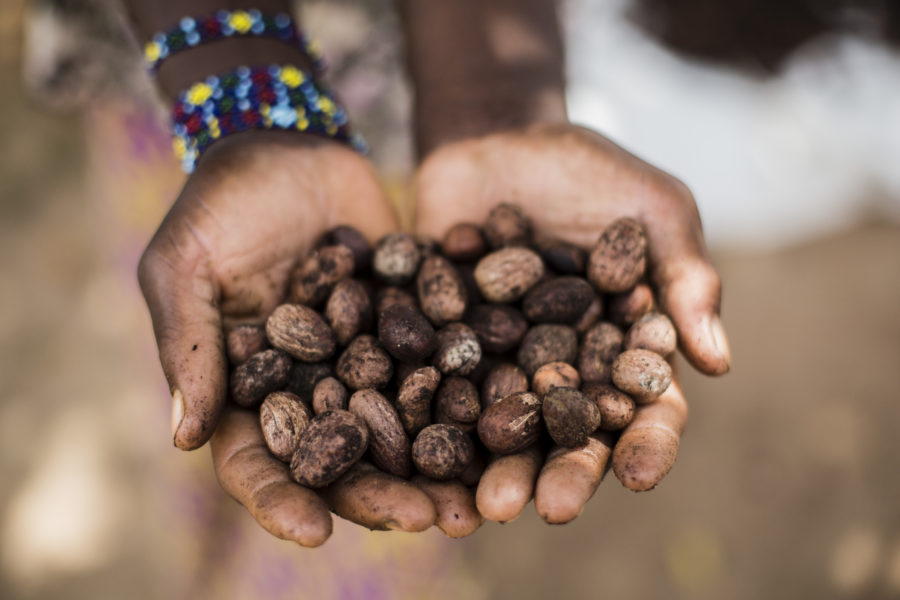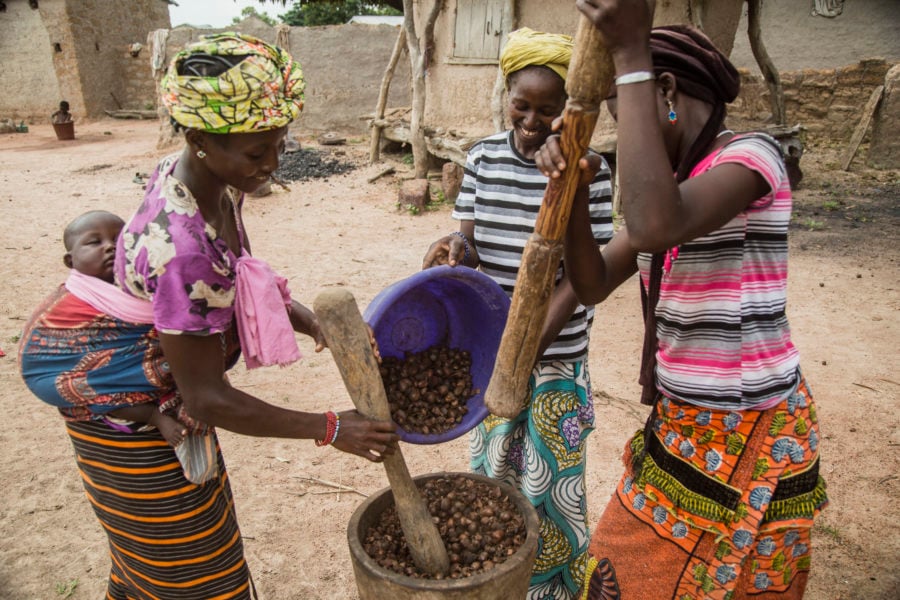Together with companies, MVO – The Netherlands, and West African NGOs, Cordaid is conducting research into the risks of child labour in the supply chain of shea in West Africa. In a second phase, we will tackle the possible causes of child labour that emerge from the research.

Shea butter is a natural component that is in increasingly high demand in the worldwide cosmetics and food industries.
A large part of its production is in the hands of women in West Africa. They often work in rural conditions and have limited market opportunities. On top of that, they must also deal with the impact of climate change: desertification and soil erosion are a direct threat to the shea tree and to production.
To support women in addressing these challenges, Cordaid has been running the Birds, Bees and Business project since 2018, together with Vogelbescherming and with financial support from the Nationale Postcode Loterij. The project’s aim is to restore biodiversity of the shea tree habitat and to improve market opportunities for West African women who work in the shea sector.
Teaming up with the private sector
Now, in addition to improving biodiversity and increasing livelihoods opportunities, we are also part of a consortium that investigates the risk of child labour in the shea sector.
“Tackling child labour can only be done effectively if all stakeholders work together: large international companies, governments, civil society organizations, in close collaboration with the communities where shea is harvested. This is exactly what this project is about.”
The consortium consists of MVO, West African NGOs like PAS in Ghana, and some of the largest international companies in the shea industry (such as Bunge Loders Croklaan, Fuji Europe Africa, Wilmar/Olenex and AAK). The Netherlands Enterprise Agency (RVO) co-finances the four-year project.
Poverty, lack of education, and the fact that shea harvesting and shea butter production take place in remote areas, are some of the factors that make the shea chain vulnerable to child labour.
“Because so many factors play a role, investigating and tackling child labour in large international supply chains, such as those in the shea sector, is incredibly complex,” explains Dieneke de Groot. She is an expert in Corporate Social Responsibility at Cordaid. And she also represents Cordaid in the (Dutch) CSR Agreement for the Food Products Sector.
“Individual parents or small producers cannot do this on their own. It can only be done effectively if all stakeholders work together: large international companies, governments, civil society organizations, in close collaboration with the communities where shea is harvested. This is exactly what this project is about,” continues de Groot.
First phase: identifying risks
In the first project phase, Cordaid coordinates research to identify the risks and causes of child labour in the shea sector. “We do that in Mali, Burkina Faso and Ghana,” says Sébastien Dohou, who works for Cordaid and coordinates the research activities.
“In the coffee and cocoa chains, so important for West Africa, there are existing initiatives to combat child labour. In the shea sector, on which millions of West African women and their families depend, improvements can likely be made as well. In that sense, the initiative of this international consortium is innovative,” says Dohou.
“Our research focuses on the shea chain in West Africa: the harvesting, washing, drying, grinding, and processing of the nuts. It is completely different from the big commercial coffee and cocoa plantations. Shea nuts only grow in the wild. And the harvesting is done almost exclusively by women.”

“In this research, we focus on the upstream part of the chain, before export takes place. This is because the large international companies that buy and process the local shea butter often already follow strict guidelines and take measures to prevent child labour”, Dohou adds.
Second phase: countering causes and reducing risks
The outcome of first phase of the project (the research) determine follow up actions for the second phase. If child labour is a confirmed risk in the shea supply chain, the parties will jointly develop and implement a strategy to address the causes and reduce the risk of child labour.
Due diligence legislation
This project supports companies to comply with recent Dutch legislation. The Child Labour Due Diligence Act imposes a duty of care on companies that supply goods and services to consumers in the Netherlands to prevent child labour within their production chains. European legislation is also being prepared imposing companies to prevent human rights violations and environmental risks and impacts within their own activities and supply chains.